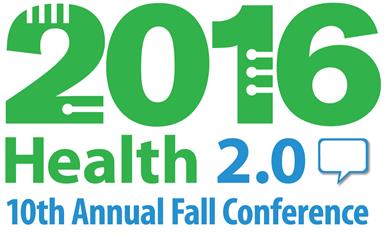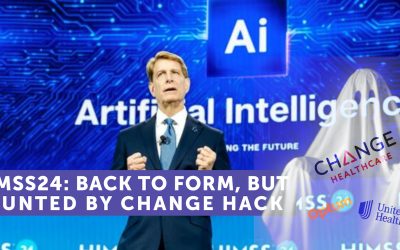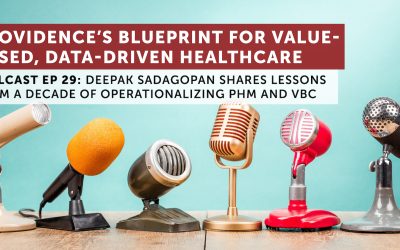
The pleasure comes from the excitement of seeing so many dedicated people all trying to do their part, in some innovative way, to improve the healthcare system. The energy they exude is contagious. As a result, Health 2.0 often feels like the antithesis to the staid and conservative annual HIMSS conference. I come to this event to see what lies on the horizon, I go to HIMSS to see what is happening now.
But that excitement and a certain naiveté has also been frustrating. Frustration comes from having seen a profound lack of reality among a significant percentage in attendance. Is it the Silicon Valley effect? Too often start-up companies seemed oblivious to the countless challenges present in this convoluted market and lacked a deep understanding of what is needed. But being altogether all in the same place, these energetic founders of young companies all drank from the same fountain – the cheerleading was deafening. Come back two years later and most had fallen to the wayside.
In its early years Health 2.0 was heavily weighted towards frustration. Beyond the naïve-istic cheerleading, there was a lack of diversity, of heterogeneity in the audience. It was an event about, for and ultimately comprised of start-up health companies. There were few, if any providers – maybe a couple on stage at some point.
But as the HITECH Act took hold and federal dollars came in to encourage EHR adoption, broader interest in the digitization of healthcare accelerated. The floodgates opened and investment dollars came pouring in to the digital health space rising from the low $100’s of millions in 2007 to some $5B projected in 2016 much of it going to start-ups.
This investment influx led to more sophistication among the start-up companies attracted to Health 2.0. The organizers responded in kind with the content becoming more robust and the audience more diverse in the ensuing years. The hyperbole has also been turned down several notches. Health 2.0 is now a dynamic conference, with an excellent line-up of speakers and topics discussed. Sure, there remains a certain odd “campiness” to the event, but that is part of its charm.
While this event has matured and expanded, one thing does strike me as puzzling: Why are there so few of the mainstream vendors of HIT at this event? Is Health 2.0 seen as just some odd side-show to the grander market (e.g. HIMSS)? Is there a country club bubble that more traditional HIT vendors reside in with little desire to look down the street to what may be marching their way? Is it simply a lack of attention, wherewithal or interest to the dominant theme at Health 2.0 – consumer/patient/member engagement and empowerment? If it is the latter that is a sad commentary on incumbent HIT vendors.
As we articulate in our latest report and have done so elsewhere, the future success of population health management programs will be highly contingent upon far deeper consumer engagement. Thus, if I were leading strategy for one of those incumbent HIT companies, I’d surely send someone to Health 2.0 to ensure that my company gets out of the bubble to see what might be next and more importantly, who might be a target for partnership or future acquisition as we develop our consumer, patient or member engagement strategy.
Like the Health 2.0 event, Chilmark Research also got its start in 2007. Together, in our own ways, we are each trying to move the needle in healthcare to ultimately improve the consumer experience. Much has transpired in this brief decade that makes it seem long upon reflection but short in action. The industry is going through a profound transformation. Just as we are moving to digital health, the industry may indeed be slowly pivoting, as athenahealth’s Jonathan Bush stated: to “network health.” Looking ahead, I wish Matthew, Indu and the broader Health 2.0 team another decade of success, joining us in pushing the boundaries to ensure that the this sector meets the promise that a truly network model of health may offer.




So John, it’s no longer a conference full of gimmickry and no real substance? No more founders with apps who have no concept of how to integrate into the tricky provider and payer systems?
Well, I didn’t quite say that…
There still remains a significant amount of puffery, but when one compares it to years past, Health 2.0 has improved markedly.
But your point raises the question: Is there not a lot of puffery, gimmickry at virtually any major conference that relies heavily on vendor sponsorship? Just look at that staid stalwart of the HIT industry HIMSS and how every vendor at HIMSS, and I mean everyone is promoting themselves as a PHM vendor.
So is Health 2.0 really any different than others? I would argue not in this regard.
Good point. However, the biggest challenge at HIMSS is groupthink (e.g., PHM). The word that comes to mind at Health 2.0 is “unhinged”. There just doesn’t seem to be a basic understanding of the fabric of healthcare, the dynamics between the three Ps, and an appreciation for the complex economics of our industry.
Can’t argue with you there. Over the years this has been one of my chief frustrations with Health 2.0. The lack of a deep level of understanding of the true complexity of this market is something I come across frequently at Health 2.0
That being said, having speakers from UPMC, Cedars-Sinai and the like at least attempts to address this issue, which is an improvement, no matter how modest.
Comes down to incentives. As long as the conference organizers make money through the Health 2.0 platform, there is little incentive to change towards the truly hard problems that need to be solved at the system and institutional levels. Perhaps Chilmark can consider developing such an event?
Hmm, that may be a good idea. Maybe we should take conversation offline to pursue further what that might look like. Drop an email to info@chilmarkresearch.com and we can go from there.
I cant believe John is so complimentary after all these years!
Leaving aside all those matters of opinion, the question of the “big vendor” attendance at Health 2.0 is pretty obvious. Of the top 9 Allscripts & athenahealth are there in force, and eCW’s Healow sub is also a regular exhibitor and attender. Healow is directly competing with many other “Health 2.0” companies, and athenhealth & Allscripts are the two major vendors how have explicitly gone after the platform & partnership model.
Of the other vendors, GE & McKesson are basically out of the business. That leaves Meditech–least sophisticated client base, oldest technology on hospital side. Nextgen, which should be there as its getting interested in cloud. Cerner, which has been at Health 2.0 in the past but seems to be hesitant to really embrace the cloud side & Epic. I’ve invited Carl Dvorak many times, but Epic is the vendor that has the most to lose and least to gain from becoming open.
One last comment–They’re all going to come our way, but as Ian Morrison say, this is an industry that moves at the pace of glacial erosion. Just because Health 2.0 was early to spot the transition doesn’t mean the HC business isnt going to change. And do you really think HIMSS will be the venue of technology for the new world?